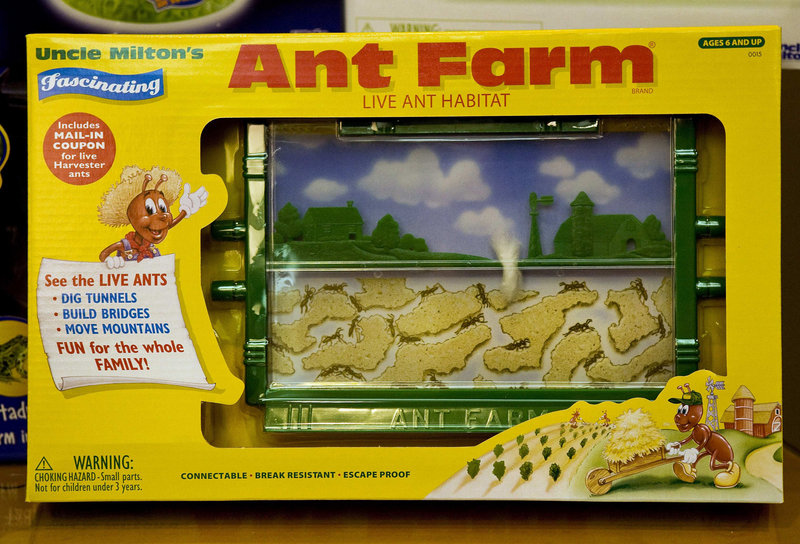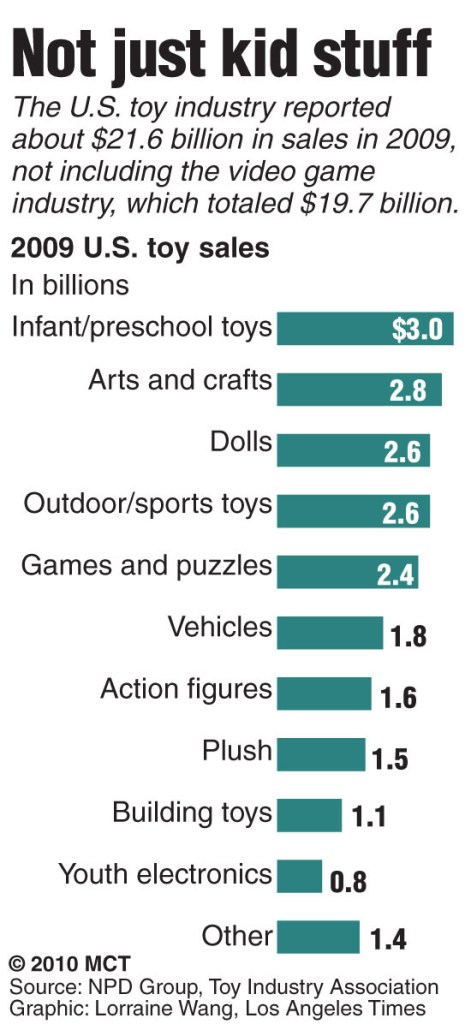LOS ANGELES – The allure of ants may escape most people, but Uncle Milton Industries Inc. has based decades of success on the creatures.
The Westlake Village, Calif., toy maker is famous for inventing the ant farm in 1956 as well as other playthings in the science-and-nature niche.
Uncle Milton’s Ant Farm is so popular and has spawned so many imitators that company President Frank Adler may be only half joking when he says: “We do supply the ants from a secret source; we’d tell you but then we’d have to kill you. Competition is always seeking out that information.”
After 64 years of family ownership, the company was sold last month to Transom Capital Group, a Los Angeles private equity firm with plans to jump-start Uncle Milton’s growth. Details of the transaction weren’t disclosed, but Transom said that the company was valued between $30 million and $40 million.
The deal comes at a time of evolution for both the toy industry and Uncle Milton, which bears the name of its 96-year-old co-founder, Milton Levine.
“There’s this known thing that’s affecting the industry called kids getting older younger,” said Adler, 47. “It’s challenging to create products that are still exciting to kids who have more computing power in their Xbox than there was in the lunar lander.”
SCIENTIFIC TOYS SELLING
Increasingly sophisticated young consumers, combined with a rocky economy, have squeezed the industry in recent years. In 2009, traditional toy sales in the United States (which exclude video games) fell about 1 percent to $21.47 billion from $21.65 billion in 2008 and were off a steep 6 percent from 2003’s sales of $22.9 billion, according to a report by NPD Group.
One bright spot is the science-and-nature category, which has bucked trends because of increased product innovation, said Anita Frazier, an industry analyst at NPD Group. In 2009, sales of scientific toys rose 4.6 percent to $128 million from $101 million in 2008.
Uncle Milton Industries was founded in whimsy. Milton Levine joined forces in 1946 with his brother-in-law after returning home from serving in World War II. He and E. Joseph Cossman sold mail-order oddities such as plastic shrunken heads and toy guns that shot potatoes.
After moving to Los Angeles from Pittsburgh, the duo created the first ant farm in 1956 by repurposing plastic tissue dispensers and adding sand. They settled on the now-familiar green farm scene to lend the toy a fun and kid-friendly vibe and have sold more than 20 million over the years.
Toys that dabble in the educational and the scientific have become the company hallmark.
Last August, Uncle Milton began selling Force Trainer, a high-tech toy that excited “Star Wars” fans, science fiction buffs and anyone wishing to defy the laws of physics.
With a headset that reads brain waves, a player can move a ball up and down a glass tube by increasing and decreasing levels of concentration (a fan actually does the work). Yoda’s rasping voice guides aspiring Jedi knights through 15 levels of “force training.”
ANNUAL SALES REMAIN FLAT
Force Trainer flew off store shelves in some areas. Its only competition — Mattel’s Mindflex, which utilizes the same technology — sold out during the 2009 holiday season.
Since launching, several thousand Force Trainer toys have been sold, said Russ Roenick, a managing director at Transom Capital.
Despite the toy’s success, annual sales at Uncle Milton have remained flat the last three or four years, though “total sales have doubled since 2000,” Roenick said.
Slow growth can be attributed to the economic downturn, along with resource limitations and some operations problems, Roenick said.
For instance, the procedure for ordering ants has remained unchanged since Uncle Milton first offered the creatures for sale. A customer must fill out a coupon, include a check and then mail it.
A team at corporate headquarters then opens the mail, processes the check and rekeys that data into a computer. Orders are then sent to the ant fulfillment center.
Transom stepped into the mix in March. The Levine family had already been talking to prospective buyers.
“My dad actually knew somebody who knew Transom,” Adler said. “It was one of those things that just came together.”
The two companies began discussions in mid-March and closed the deal at the beginning of June.
Former CEO and President Steven Levine, the son of Milton Levine, remains at the company in an advisory role. His sister Ellen continues as an accounts services manager. Steven Levine wasn’t available for an interview but said in response to e-mailed questions that his family decided that selling the operation was “in the best long-term interest of the company.”
Transom has been busy cutting down costs and increasing innovation. One method of survival — and growth — will be adaptation, Adler said.
Uncle Milton’s target customers traditionally have been boys 6 to 11, which ignored a whole population of female toy users. Newer products such as Rainbow in My Room, a device that projects rainbows onto walls, was designed explicitly to appeal to girls.
SOUND-ACTIVATED TARANTULAS
Increased licensing beyond the “Star Wars” brand is also “definitely on the table,” Roenick said. “That’s how we can attack new markets, go after girls and different age groups open doors to new audiences.”
On the design end, the company has “become best friends” with its manufacturers, all located in China, Roenick said. That means, for example, seeking cost-cutting advice from manufacturers as products are designed, which ultimately lowers production costs, he said.
Innovation can’t be neglected, Adler said. The big crowd pleasers this year are expected to be sound-activated tarantulas and a light saber night light — both new toys.
The arachnids come outfitted as a pirate, a soccer player, a soldier, a racer and a rock-and-roller and scurry toward the sound of a clapping hand. The room light is one of five “Star Wars” toys rolled out this year; designed for kids to assemble, it’s expected to be “this year’s Force Trainer,” Adler said.
In three to five years, after streamlining operations, Transom intends to sell Uncle Milton, Roenick said. “A strategic acquirer, like Mattel, may decide they want to buy Uncle Milton and integrate it. Or a Hasbro or a Learning Curve,” he said.
Which leaves the future murky but one thing clear: Uncle Milton will continue to design and produce toys that educate children.
“We make science accessible to every kid,” Adler said. “If we excited just one kid about science, then we’ve done our jobs.”
Copy the Story Link
Send questions/comments to the editors.




Success. Please wait for the page to reload. If the page does not reload within 5 seconds, please refresh the page.
Enter your email and password to access comments.
Hi, to comment on stories you must . This profile is in addition to your subscription and website login.
Already have a commenting profile? .
Invalid username/password.
Please check your email to confirm and complete your registration.
Only subscribers are eligible to post comments. Please subscribe or login first for digital access. Here’s why.
Use the form below to reset your password. When you've submitted your account email, we will send an email with a reset code.